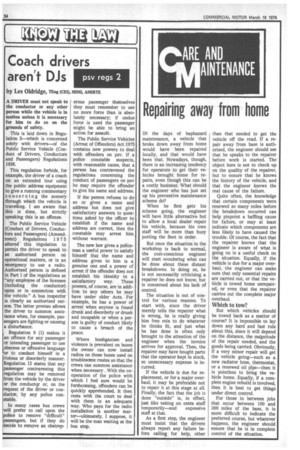ARE AND AINTENANCE Repairing away from home
Page 56

If you've noticed an error in this article please click here to report it so we can fix it.
IN the days of haphazard maintenance, a vehicle that broke down away from home would have been repaired locally, and that would have been that. Nowadays, though, there is an increasing tendency for operators to get their vehicles brought home for repairs, even though this can be a costly business. What should the engineer who has just set up his preventive maintenance scheme do?
When he first gets his scheme going, the engineer will have little alternative but to allow a local dealer repair his vehicle, because his own staff will be more than busy putting the fleet in order.
But once the situation in the workshop is back to normal, the cost-conscious engineer will start wondering what can be done about these distant breakdowns. In doing so, he is not necessarily criticising a repairer he does not know, but is concerned about his lack of control.
The situation is out of control for various reasons. To start with, since the driver merely tells the repairer what is wrong, he is really giving him free rein to do whatever he thinks fit, and just what he has done is often only brought to the attention of the engineer when the invoice arrives for approval. Then, the repairer may have bought parts that the operator kept in stock, so unnecessary expense is incurred.
If the vehicle is due for replacement, or for a major overhaul, it may be preferable not to repair it at this stage at all. Finally, the fact that the job is done "outside" is, in effect, just like taking on extra staff temporarily—and expensive staff at that.
As a first step, the engineer must insist that the drivers always report any failure before calling for help, other than that needed to get the vehicle off the road. If a repair away from base is authorised, the engineer should see that he speaks to the repairer before work is started. The object here is not to check up on the quality of the repairer, but to ensure that he knows the history of the vehicle, and that the engineer knows the real cause of the failure.
Quite often, the knowledge that certain components were renewed so many miles before the breakdown occurred can help pinpoint a baffling cause for failure, or may at least indicate which components are less likely to have caused the trouble, Of course, the fact that the repairer knows that the engineer is aware of what is going on is a useful check on the situation. Equally, if the vehicle is due for a major overhaul, the engineer can make sure that only essential repairs are carried out, or that the vehicle is towed home unrepaired, or even that the repairer carries out the complete major overhaul.
Which to tow?
But which vehicles should be towed back as a matter of course? It is impossible to lay down any hard and fast rule about this, since it will depend on the distance, the magnitude of the repair needed, and the goods being carried. Obviously, if a very minor repair will get the vehicle going—such as a new radiator hose, thermostat, or a renewed oil pipe—then it is pointless to bring the vehicle home. Equally, if a complete engine rebuild is involved, then it is best to get things under direct control.
For those in between jobs that occur between 100 and 200 miles of the base, it is more difficult to indicate the preferred course, but whatever happens, the engineer should ensure that he is in complete control of the situation.








































































































